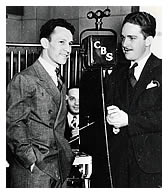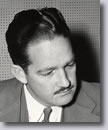
Announcer Charles Crutchfield (right) interviews lion tamer and wild animal trainer Clyde Beatty in a WBT studio. Circa mid-1930s.


Announcer Charles Crutchfield (right) interviews lion tamer and wild animal trainer Clyde Beatty in a WBT studio. Circa mid-1930s.
 By Charles H. Crutchfield
By Charles H. Crutchfield
Charlotte Observer, June 27, 1982
Sometime in 1920, Radio Station 4XD, the direct ancestor of WBT, signed on in Charlotte.
In the first successful broadcast, a receiver in a chicken house picked up the sound of a phonograph record played into a transmitter 100 feet away in the home of F. M. Laxton.
On April 10, 1922, Station 4XD became WBT, the first commercially licensed radio station in the Carolinas and one of the first in the nation. It operated with a power of 100 watts, about that of an average light bulb.
WBT moved to studios in the Coddington Building at the corner of West Trade and Graham Streets in 1925, and increased power to 500 watts. It was associated with a Buick car agency in that building, and the call letters were said to stand for "Watch Buicks Travel."
In 1929, the Columbia Broadcasting System radio network acquired WBT; the transmitted power was increased to 10,000 watts, and Grady Cole joined the staff as a news announcer.
WBT went to full authorized power of 50,000 watts in 1933, and I joined the staff as an announcer.
In looking back over some 44 years with WBT, I can recall what must be a thousand incidents relating to this fascinating profession we call show business. The ones that really stand out, however, are those which happened back when radio was young — back when we all were a little less sophisticated and perhaps a little more awed by this wonderful medium called radio.
It was a Sunday afternoon around 1933 or 1934. I was a brassy young announcer with a lot of enthusiasm. We got wind of a wedding between the two oldest former slaves in the country — a 97-year-old man and a 92-year-old woman — both of them getting married for the first time.
It being Sunday, and little else happening, the spare engineer and I decided to cover this big event. Loading our equipment, we hopped into my car (a 1929 T-model Ford) and headed down toward Pineville.
What we thought would be a rather routine assignment suddenly developed complications when the Board of Deacons — after a hurried huddle — decided that it would be sacrilegious to broadcast from the church. Things were looking pretty bleak until the Chairman of the Board, a lean, white-haired old fellow, admitted that he "jest mite" crack one of the windows for a little "consideration."
Poorer by two dollars, I climbed a plum tree outside the window — stuck the mike inside, and aired the entire ceremony. Then, I jumped in the car, pulled up to the front steps, jumped out, opened the door, and told the couple that this was the official wedding car.
They climbed in, and we got an interview with the couple — both of them toothless and grinning from ear to ear. When I asked the groom what his plans were, he came out with this classic: "I'm gonna quit running 'round, settle down, and start raising a big family."
Several years later, we had eight Civil War veterans in the studio to record the Rebel yell. The youngest one must have been at least 90, and all of them were full of pep and vinegar.
Right after they had demonstrated the yell for the radio audience, one old fellow got so excited that he jumped up and screamed, "shoot the damn Yankees!"
There are other memorable occasions, but the one that gave me my greatest thrill and at the same time provided my greatest moment of embarrassment came in 1936 during President Roosevelt's inaugural parade.
I had been selected by CBS to work with H.C. Kaltenborn in describing the parade in Washington.
It was a nasty day — with snow and sleet falling and the ground as slick as glass. I huddled down inside the official car and began bullshooting, telling people that the weather was so bad I couldn't get outside on the running board to see what was happening. Before I knew it, I had been jerked off the air, and Kaltenborn — who must have been 65 then — put on. He was perched on the running board of the car behind me and describing things to beat the band.
This incident brings to mind a remark made by Grady Cole when a fellow asked him why he talked so much. Grumbled Grady, "Buddy, I never made a nickel listening." And Grady, perhaps without realizing it, pretty well summed up the job of all of us in radio — to talk, to inform and (we trust) to entertain.
Charles Crutchfield retired in 1977 as president of Jefferson-Pilot Broadcasting Co., parent company of WBT.